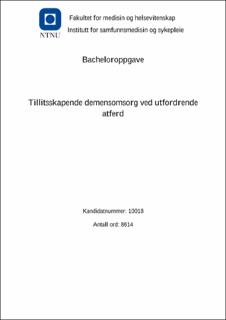| dc.contributor.advisor | Nakrem, Sigrid. | |
| dc.contributor.author | Falch, Øystein. | |
| dc.date.accessioned | 2020-07-17T16:03:02Z | |
| dc.date.available | 2020-07-17T16:03:02Z | |
| dc.date.issued | 2020 | |
| dc.identifier.uri | https://hdl.handle.net/11250/2669581 | |
| dc.description.abstract | Tittel: Tillitsskapende demensomsorg ved utfordrende atferd.
Hensikt: Oppgavens hensikt er å finne ut hvilke tilnærmingsmetoder og tiltak en som sykepleier eller annet helsepersonell kan og bør anvende i møte med utfordrende atferd hos eldre personer med demens i sykehjem, samt hvilke forhold som kan skape utfordringer knyttet til dette.
Problemstilling: Hvordan kan tillitsskapende tiltak benyttes for å gi god omsorg og livskvalitet til personer med demens og utfordrende atferd i sykehjem?
Metode: Oppgaven er en litteraturstudie, som bruker 9 forskningsartikler, som alle på sin måte belyser ulike tilnærmingsmetoder relatert til utfordrende atferd hos personer med demens
Resultat: Litteratur og forskning viser at dersom en tilstreber personsentrert tilnærming gjennom tillitsskapende tiltak til personer med demens med utfordrende atferd vil en kunne begrense og forebygge denne atferden, samt forhåpentligvis gi bedre omsorg og styrke livskvaliteten til pasientgruppen. De viktigste nøkkelpunktene som trekkes fram var utdanning og kompetanseheving blant ansatte, se hver enkelte pasients behov og situasjon, kartlegge bakenforliggende årsaker til atferden og videre utarbeide tiltak og sørge for at denne informasjonen kommuniseres og dokumenteres til alle som utøver omsorg for den personen.
Konklusjon: Funnene gjort i faglitteratur og forskningsartikler konkluderer med at en personsentrert tilnærming skal være utgangspunktet i utarbeidelsen og utøvelsen av tillitsskapende tiltak. Dette er essensielt for å kunne gi god omsorg, håndtere atferd, og ivareta behovene til eldre personer med demens.
Nøkkelord: Utfordrende atferd, Demens, Tillitsskapende tiltak, Ikke-farmakologiske intervensjoner, Sykehjem, Omsorg. | |
| dc.description.abstract | Title: trust-building dementia care with challenging behavior.
Purpose: To look at how nurses and other health care staff can use non-pharmacological interventions based on a person-centered approach when dealing with old patients with dementia in nursing homes who exhibit BPSD and challenging behavior, and factors that can inhibit this work.
Topic question: How can a non-pharmacological, trust-building approach be used to provide good care and ensure good quality of life for elderly patients with dementia in nursing homes who exhibit challenging behavior.
Method: Literary review with selection of 9 research articles, all of which highlight different aspects related to dealing with challenging behavior in elderly people with dementia.
Result: Both literature and research show that striving for a person-centered approach through non-pharmacological interventions for persons with dementia and challenging behavior can limit and prevent this behavior and its symptoms, in addition to providing a better care environment and a higher quality of life. Key aspects are highlighted: education for care-staff, see each person as an individual, with individual needs and try to see the situation form their point of view, map the factors contributing to the behavior, and further come up with interventions and make sure to document and relay this information to all staff caring for that person.
Conclusion: Findings in both research and other literature concludes that a person-centered approach should be the foundation for establishing and implementing non-pharmacological interventions. This is essential regarding providing good care, managing behavior and preserving the needs of elderly people with dementia.
Key words: Challenging Behavior, Nursing home, Dementia, Non-pharmacological interventions, care. | |
| dc.publisher | NTNU | |
| dc.title | Tillitsskapende demensomsorg ved utfordrende atferd | |
| dc.type | Bachelor thesis | |
